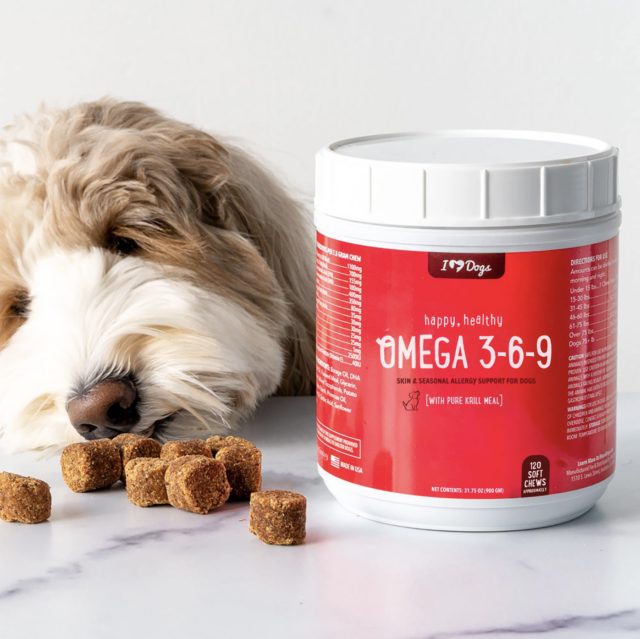Just like humans, dogs can suffer a decline in mental health as they age. Sometimes, they can even decline into cognitive dysfunction syndrome, a condition which is similar to Alzheimer’s disease. Luckily, there are many ways to help keep your dog’s mind sharp, even as he ages. The sooner you implement some of the things on this list, the more likely it is you can reduce your dog’s cognitive decline as he ages. Now that dogs are living longer lives, we want them to be able to live the best quality life possible. Here are 5 ways to feed your dog’s brain.
#1 – Use it or lose it
Studies have shown that adults can prevent and even reverse some dementia by playing brain training games. The same holds true for our dogs. Teaser balls are one way for dogs to use their brains in a clever way that can help reduce the likelihood of declining brain function. Teaching your dog new tricks and going on different routes for your daily walks are also great ways to engage your dog’s brain.

#2 – Luteolin
Luteolin is flavanoid found in fruits and vegetables that is showing promise in improving brain function in mice and people. While there haven’t been specific studies on dogs, it stands to reason that something which helps both mice and humans can have a similar effect on our pups. Luteolin can be found in celery, thyme, green peppers, carrots, and rosemary, which can all be added to your dog’s diet.
#3 – B Vitamins
B vitamins are proving to be crucial for brain health. B-complex vitamins include all of the water-soluble vitamins except C. Since many different vitamins fall under the B-complex banner, they are responsible for a wide variety of responses within the body. For example, B6 is used to form neurotransmitters and B12 is used to make red blood cells and DNA. B vitamins can be found in a wide variety of foods, including most meat.

#4 – Vitamins C & E
Vitamin C is necessary for the development of certain neurotransmitters and it’s also an important antioxidant. Vitamin E consists of several fat-soluble compounds that have antioxidant properties. Antioxidants protect against damage from free radicals – atoms or molecules with at least one unpaired electron, which can interfere with normal cell function. Antioxidants may help prevent cancer, arthritis, and memory problems. They can usually be found in fruits and vegetables. If you’re concerned that your dog might not be getting enough Vitamins B, C, or E through their diet, you may want to consider adding this great multivitamin to their diet.
#5 – DHA and EPA
Omega-3s such as DHA and EPA are essential for overall health and especially for brain health. DHA makes up almost a third of the structural fats in the brain and 97% of the total omega-3s in the brain. A 2012 study done on Beagle puppies showed that a fish oil supplement with DHA in it helped improve learning; memory; and motor, immune and retina functions during the developmental stage. A diet rich in fish may provide your dog enough DHA, but there is a way you can be certain your dog is getting enough.
Omega 3-6-9 Select Grain Free Skin & Coat Chews With Pure Antarctic Krill Oil
Krill oil has even more benefits than fish oil, and now it’s available in a tasty dental treat that your dog will love while it scrubs plaque off your dog’s teeth! Grain-free, gluten-free, and with no artificial coloring, these treats support skin, coat, joint, heart, immune system, and cellular health as well as brain and eye development and maintenance. Krill is more sustainable than fish and contains less mercury.
Plus, each purchase provides 14 meals for shelter dogs!
These statements have not been evaluated by the Food and Drug Administration. This product is not intended to diagnose, treat, cure, or prevent any disease. The information on this website is not intended to replace a one-on-one relationship with a qualified healthcare professional.

 Toledo, United States.
Toledo, United States.